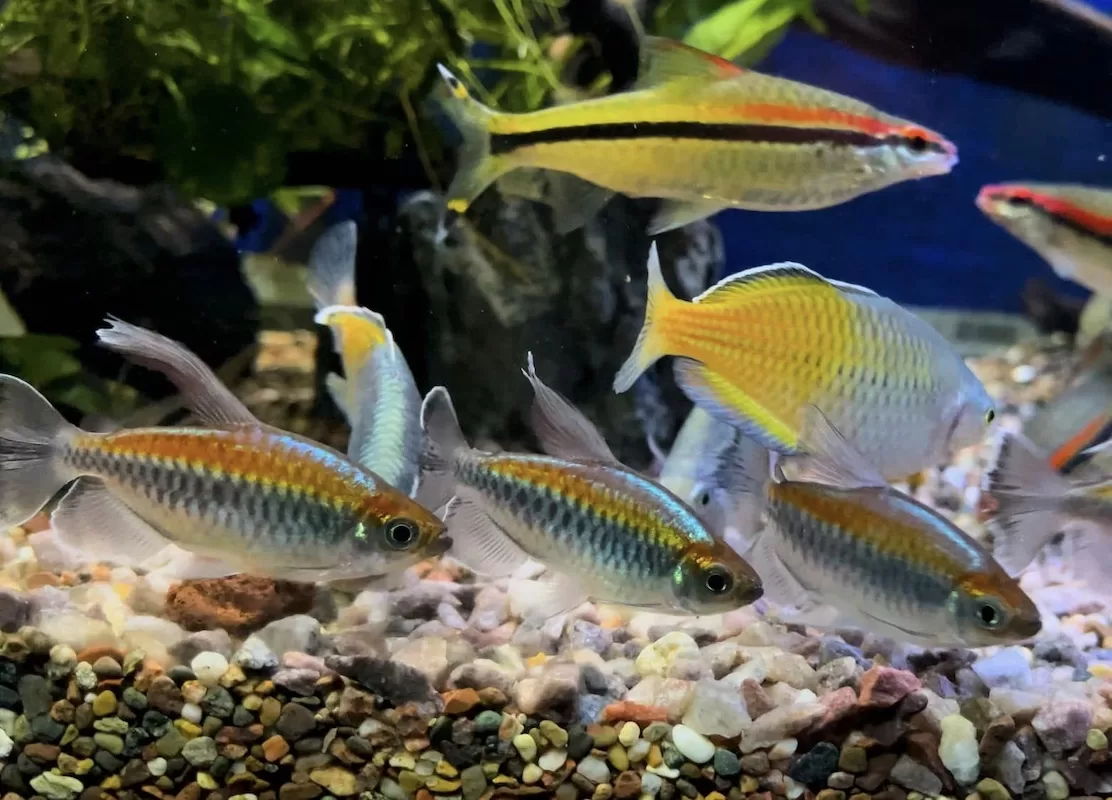Why Are My Fish Fighting? Practical Steps to Stop Aquarium Aggression
Table of Contents
- Why Do Fish Fight?
- What are territory battles?
- Is overcrowding a cause of fish aggression?
- Can bad fish pairings cause fights?
- Why do fish fight during breeding season?
- How do lack of hiding spots lead to fighting?
- How Can You Stop Fish From Fighting?
- Should you rearrange your tank?
- Does water quality affect fish aggression?
- When should you use a tank divider?
- How Can You Maintain Long-Term Peace in Your Tank?
- How should you plan fish additions?
- How do tank zones help maintain peace?
- When should you rehome an aggressive fish?
- Final Thoughts
Why Do Fish Fight?
You ever watch one fish chase another and think, “What’s your problem, little guy?” Fish are territorial, sure, but sometimes it goes deeper than that. It is like having roommates who just cannot get along. You know how it is. Let me break down some of the most common reasons you will find your fish turning into tiny gladiators.
1. What are territory battles?
Some fish just want their space, and when someone else swims into their ‘zone,’ all bets are off. I had this pair of dwarf gouramis once. Beautiful fish, but boy, they were like grumpy old men fighting over a park bench. They each staked out a corner of the tank and would not let the other near it.
What can you do? Well, try adding a few more decorations, rocks, and plants. Fish need to feel like they have their own little nook to hang out in. The more stuff you toss in there, the more they can hide or claim as their own. Plus, it breaks up the line of sight, which gives them a sense of privacy. Who knew fish needed privacy, right?
2. Is overcrowding a cause of fish aggression?
You ever feel cramped in a crowded elevator? That is what an overcrowded tank feels like for your fish. Even the most peaceful fish will start to get snappy if they do not have enough room.
One time, I had way too many guppies in my tank. You know how guppies are. They just multiply like crazy. Before I knew it, my nice, calm tank was a madhouse. It was like fish bumper cars in there.
To fix that, you just need to be mindful of how many fish your tank can comfortably house. You have probably heard the one-inch-of-fish-per-gallon rule. It is not perfect, but it is a decent start. If your tank feels crowded, either upgrade to a bigger one or find a new home for some of your fish. There is no shame in admitting you overstocked. We have all been there.
3. Can bad fish pairings cause fights?
Let me tell you about the time I tried to put a betta in a tank with some fancy guppies. Big mistake. I thought they would look nice together, but the betta had other plans. He chased those poor guppies around like they owed him money.
Certain fish just do not mix, plain and simple. Some are too aggressive, some are too delicate, and some just rub each other the wrong way. It is like putting a cat and a mouse in the same room and expecting them to be best pals.
The fix? Do your research before adding new fish to your tank. It is like setting up a blind date. You do not want to pair the wrong personalities together. If you are not sure, go with more peaceful species that are known to play nice with others. Trust me, it will save you a lot of headaches.
4. Why do fish fight during breeding season?
Ah, breeding season—the time when even the calmest fish can turn into territorial nightmares. I had a pair of cichlids that went from mild-mannered to mini monsters the second they decided to start a family. They practically took over the tank, and anyone who wandered into their area was in for a fight.
Breeding behavior can cause fish to get defensive, aggressive, and downright nasty. If you notice a sudden uptick in aggression, there is a good chance some romance is in the air.
You can help by adding more hiding spots or temporarily separating fish during the breeding period. Sometimes, you have to let nature take its course, but you can still make it a little easier for everyone involved.
5. How do lack of hiding spots lead to fighting?
Fish need places to chill. Simple as that. If they cannot find a spot to hide, they get stressed. And when fish get stressed, they get cranky. It is like when you come home from a long day and just want to be left alone, but someone keeps barging into your room. Yeah, no thanks.
One of the easiest ways to keep the peace is to add more decorations. I am talking plants, caves, rock formations—anything that gives your fish a place to retreat to. When I added a few more plants to my tank, it was like flipping a switch. The fights stopped, and everyone found their little hidey-hole.
How Can You Stop Fish From Fighting?
Alright, so now you know why your fish are fighting. But how do you stop it? Here are a few things I have learned over the years. Hopefully, it helps you as much as it helped me.
1. Should you rearrange your tank?
Sometimes, all you need to do is shake things up a bit. Literally. Rearranging the tank decor can confuse your fish and reset their territorial claims. It worked wonders for me when my angel fish was acting like a bully. I moved some rocks and plants around, and suddenly, he was not so interested in picking fights.
2. Does water quality affect fish aggression?
I know, I know. I harp on about water quality all the time. But trust me, it makes a difference. When the water is out of whack—high ammonia, nitrites, or just poor conditions—fish get stressed. And what happens when you get stressed? You snap at people. Fish do the same.
Make sure you are checking the water parameters regularly. Invest in a good test kit. I use the API Freshwater Master Test Kit to keep things in check. It has saved me a lot of hassle over the years.
3. When should you use a tank divider?
When things get really bad, and nothing seems to work, you might need to separate your fish. I have used tank dividers in the past when introducing new fish or when two just could not get along. It gives them a break from each other and can calm things down. It is not a permanent fix, but it is a good temporary solution.
How Can You Maintain Long-Term Peace in Your Tank?
If you want long-term harmony, you have got to plan ahead. It is not enough to just react when things go wrong. You need to think about the future and how you can keep things peaceful over the long haul.
1. How should you plan fish additions?
Do not rush into buying new fish just because they look cool. I have made that mistake, and it is never worth it. Take the time to research compatibility. If you are not sure, feel free to reach out to me. I love helping people figure out the best fish for their setup.
2. How do tank zones help maintain peace?
Use decorations to create different zones in the tank. That way, fish can establish their own territories without bumping into each other all the time. It is kind of like putting up walls in a shared apartment. Everyone needs a little space now and then.
3. When should you rehome an aggressive fish?
This one is tough, but sometimes, you just have to admit that a fish is not going to fit in with the rest of the crew. I have had to rehome a few fish over the years, and while it is never easy, it is sometimes the best thing for everyone.
Final Thoughts
Keeping the peace in your aquarium is a bit like keeping the peace in a family. You have to pay attention, step in when things get heated, and sometimes rearrange the furniture. The important thing is to stay patient and keep learning. Your fish will thank you for it, and so will your sanity.
If you have any questions, or if you are facing your own fishy dilemmas, drop me a line in the comments! I am always happy to help, and who knows, your experience might just help someone else out too. And hey, if you need any products to keep your tank in tip-top shape, check out our shop for all the gear I personally use and recommend.


